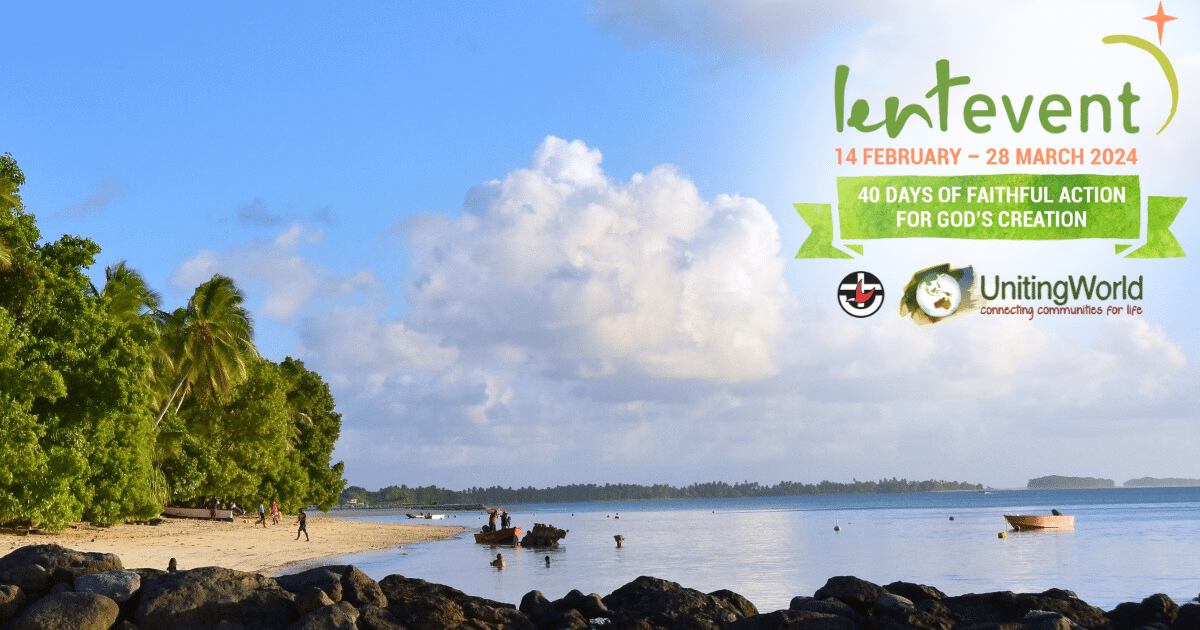
Under a sky bluer than an eye, fisherman Kekai sets his line and waits.
He’s further from the shore than ever before and, with the crippling cost of fuel for his boat, he’s hoping for a catch. Fast. But it’s quiet on the sea; warmer water means the fish are seeking the deep, and trawlers are cleaning out the area more and more frequently.
As Kekai scans the horizon, he contemplates yet another canned dinner – salt in the water table from multiple king tides is poisoning his vegetable garden and no more fresh food will arrive at his tiny Tuvaluan island until next week.
“This is the frontline of changing climate for Pacific islanders,” says Rev Seforosa (Sef) Carroll, Fijian-born Australian theologian and academic.
“Diabetes is on the rise because of the change in diet; malnutrition and waterborne diseases plague the children because it’s so hard to grow anything. Clean water and sanitation are really difficult when the land is constantly flooded by salt water.
And it’s really sad, because these are people who are traditionally independent, used to caring for their land, taking from it what they need to survive, and generally in tune with creation.”
Changing climate has wrought havoc on what should be a delicately woven web of relationships between humans and the natural world. And while there’s much more agreement these days about the reality of climate change – most people are aware that we now face not just an ecological crisis, but a ‘here and now’ climate emergency – implementing solutions is more challenging.
So ‘which God’ can fix climate change, and how?
“People in the Pacific are inherently spiritual, it’s just in their DNA,” Sef says.
“But they have this hangover from colonial encounters with missionaries that gives them a view of God that actually isn’t all that helpful. The God many worship is generally seen as transcendent and uninvolved with humanity, responsible for weather and other big events, but somewhat distant.
“Many believing Islanders are convinced that this God won’t let their lands be destroyed because of the promise to Noah in Genesis after the Great Flood. So they wait patiently for the next miracle, even while their entire sense of identity is eroded as they watch their land disappear. Doubt creeps in: where is God in their suffering?”
This is where theology really bites and cultural views of God matter deeply. The temptation to see increasingly devastating weather events as evidence of God’s punishment for sin can lead to doubling down on morality codes, while at the same time jettisoning any sense of personal responsibility or agency in the face of the emergency. Sef says:
“‘Which God’ we worship – our understanding of God’s identity – really matters. That kind of purely transcendent God is not the God of Jesus, of Emmanuel, God with us. It’s not the God that says we are caretakers with responsibility and empowerment by God’s Spirit. And helping Pacific people to shift from this kind of inheritance theology to one that says that through Christ, God is suffering with creation and God is suffering with us, is really critical. That theology can help people to be proactive and inspire them to action.”
Faith drives meaning and behaviour in many parts of the Pacific Islands. But shifting long-held understandings takes time, and that’s a commodity we simply don’t have.
“We’re sitting on a ticking bomb here,” Sef says. “And it takes time for people to unlearn and relearn theology, and to gain a new understanding of faith.”
It’s why UnitingWorld’s partnership to train ministers and theological colleges is so critical. Resources like Bible Studies and workshops are opening eyes to who God is and how God is at work in and through God’s people in the world. But the work is slow and painstaking, and it can’t be the only solution.
“Pacific Islanders might be the ones most impacted in our region by changing climate, but it’s on all of us to step up to acknowledge the impacts in our own neighbourhoods and across the globe, and to play our part. Every single one of us needs to ask ‘which God are we worshipping?’ A God who is only concerned with our ‘spiritual lives’ or a God actively involved in collaborating with us in reclaiming creation? I dream of a rigorous theology embraced by Christians around the world, inspiring us to action where we are, with what we have. It’s going to take all of us, doing everything we can.”
Watch Sef’s message in the short video below.
This year, UnitingWorld’s Lent Event is creating a movement of people committed to urgency, solidarity and faithful action for God’s creation.We’re calling on you to do something personal – make a change to your life that benefits creation during the 40 days of Lent and pray it sticks throughout the year. We’re calling on you to do something practical – make a donation to support projects across the Pacific and elsewhere that open minds to new understandings of God and drive faithful action, empower communities to protect their environment through tree planting initiatives and provide clean water. We’re calling on you to get political – contact your local representative to chat about their approaches to climate change, educate yourself about policies, and help hold government accountable for their actions. ‘Which God’ will fix climate change? The God of Emmanuel, who is with us in suffering, invites and empowers us for action. How will it happen? All of us, acting in solidarity and with urgency. Join us today at www.lentevent.com.au |
